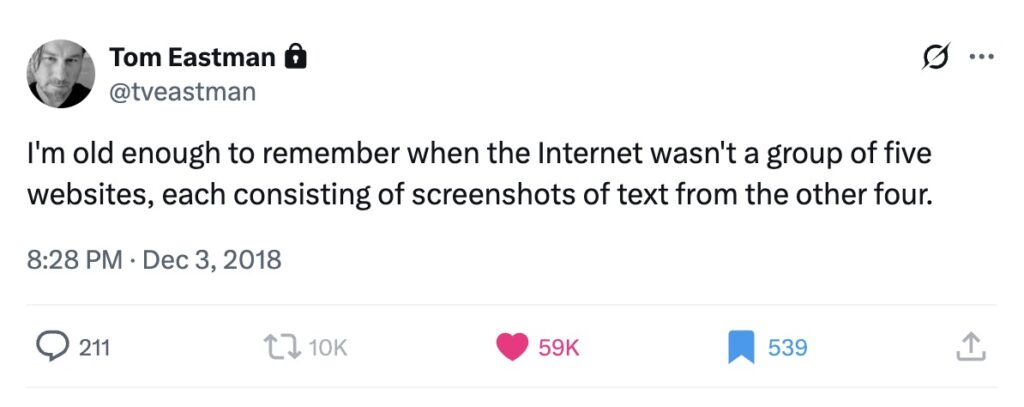There’s nothing new under the Social sun
Last Updated on: October 27, 2025
A handful of big social networks have a firm grip on the internet. TikTok, Instagram, Facebook, Twitter, YouTube, and a few more dominate most people’s screen time.
You have probably heard the anti-social-network narrative; the algorithms control our minds and steal our attention for profit. There is a lot of truth in this, but I believe we are still in control. It is still our choice how we use our time.
In the past, we heard the same arguments against watching trashy television, reading sensationalist newspapers, or getting lost in steamy romance novels. What’s new is that the social networks have captured a larger audience than ever before, and that’s sucked a lot of talented people into creating content beneath their levels.
We have been trained that engagement (clicks, views, shares, likes, and comments) is the currency with which our content is valued. This has led to ever more creative ways of grabbing your attention, at the cost of the quality of the content itself.
If you have seen “Rage Bait” cooking videos or vacuous self-help quotations, then you know what I am talking about. It’s a race to the bottom for everyone involved, and especially the social networks themselves.

There are still great things to be found
It is unfair of me to make out that modern social media is a wasteland.
There is a wealth of treasure beneath the trash. Amazing people are creating amazing things, and it just needs a little bit of digging and nuance to find it.
I often find myself looking deep into the comments on Twitter, or scrolling way down somebody’s profile looking for dusty gems. My YouTube recommendations throw up videos published 10+ years ago, and I adore them.
I guess I just hope for a little bit more. Why can’t those incredible algorithms show me what my soul really needs, instead of what my monkey mind wants?
A Wave on the Horizon
This week, OpenAI announced an upcoming feature/model called Sora that creates realistic videos from a text prompt and it’s pretty incredible. The videos created are already hard to distinguish from real videos at a glance… and this is early technology.
Making these videos will be easy and fast. Most of it can be automated. When this is released, we are going to see a big wave of these videos appear on social media.
Real content makers will be pushed out. Social networks will scramble to fix their algorithms and platforms, but it’s already too late. Today they are still struggling to fix the problems of bots, engagement farming, spam, scams, and misleading information.
We are already fatigued by the content we see daily. Back in 2018, Tom Eastman resonated with many of us with this simple but brilliant observation, (which also became an inspiration for the increasingly popular theory of Enshittification by Cory Doctorow):

Tom’s quote could now be expanded to copies of videos, images, and ideas… but that feeling of “there’s nothing new under the social sun” is stronger than ever.
So what happens when we eventually become deeply tired of scrolling?
The Inevitable Change
Eventually, everything changes.
Social Networks, as we know them today, will reach their peak. Something new will come to capture the attention of the world, and it will likely be unexpected.
Creativity comes from unexpected places. In the early days of the internet, creativity was everywhere. We built things without a profit plan, and just for kicks.
Yes, a lot of it was also junk, but it was innocent. And some great things stuck and came from it.
We can’t, of course, go back to the halcyon WorldWideWeb days of blogs with blogrolls and niche forums with a real sense of community.
But we can go somewhere new.
So…. what’s next?
Social Networks have become a mix of several things; connecting and socialising, discussing new ideas and topics, researching and getting knowledge, and being entertained.
It is my hope that they become separated somehow, as the mechanisms pollute each other. As an example, true knowledge is not always rewarded but engaging knowledge is… and that quickly spreads misinformation.
I would like to see the internet separate again into more spaces and places where people can choose to go, even if that means still using the current platforms in different ways. We have seen this with Facebook Groups becoming increasingly popular, where people can engage on one topic and set their own rules.
There can’t be a one-size-fits-all place for everything we want to do online. We need dedicated corners of the internet with flexibility to handle the nuances.
What that will look like, nobody can know… but it will be welcome and unexpected.
Get notified of new posts:

